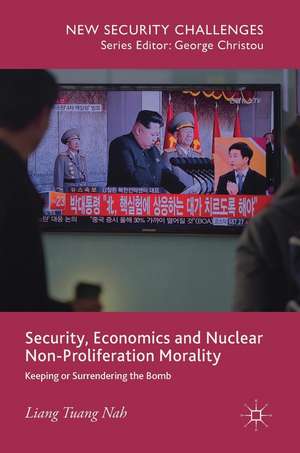Security, Economics and Nuclear Non-Proliferation Morality: Keeping or Surrendering the Bomb: New Security Challenges
Autor Liang Tuang Nahen Limba Engleză Hardback – 19 sep 2017
| Toate formatele și edițiile | Preț | Express |
|---|---|---|
| Paperback (1) | 524.55 lei 6-8 săpt. | |
| Springer International Publishing – 18 mai 2018 | 524.55 lei 6-8 săpt. | |
| Hardback (1) | 699.12 lei 6-8 săpt. | |
| Springer International Publishing – 19 sep 2017 | 699.12 lei 6-8 săpt. |
Din seria New Security Challenges
- 9%
 Preț: 763.33 lei
Preț: 763.33 lei -
 Preț: 390.63 lei
Preț: 390.63 lei - 15%
 Preț: 636.94 lei
Preț: 636.94 lei - 15%
 Preț: 580.68 lei
Preț: 580.68 lei -
 Preț: 381.59 lei
Preț: 381.59 lei - 15%
 Preț: 644.95 lei
Preț: 644.95 lei -
 Preț: 386.61 lei
Preț: 386.61 lei -
 Preț: 391.61 lei
Preț: 391.61 lei -
 Preț: 385.84 lei
Preț: 385.84 lei -
 Preț: 389.88 lei
Preț: 389.88 lei -
 Preț: 428.07 lei
Preț: 428.07 lei - 15%
 Preț: 649.06 lei
Preț: 649.06 lei -
 Preț: 383.93 lei
Preț: 383.93 lei -
 Preț: 390.63 lei
Preț: 390.63 lei -
 Preț: 388.13 lei
Preț: 388.13 lei -
 Preț: 382.18 lei
Preț: 382.18 lei -
 Preț: 392.60 lei
Preț: 392.60 lei -
 Preț: 388.72 lei
Preț: 388.72 lei -
 Preț: 387.38 lei
Preț: 387.38 lei - 15%
 Preț: 695.70 lei
Preț: 695.70 lei - 15%
 Preț: 584.43 lei
Preț: 584.43 lei -
 Preț: 383.93 lei
Preț: 383.93 lei -
 Preț: 384.86 lei
Preț: 384.86 lei -
 Preț: 388.52 lei
Preț: 388.52 lei - 15%
 Preț: 699.77 lei
Preț: 699.77 lei - 18%
 Preț: 726.37 lei
Preț: 726.37 lei -
 Preț: 384.09 lei
Preț: 384.09 lei -
 Preț: 388.13 lei
Preț: 388.13 lei -
 Preț: 385.47 lei
Preț: 385.47 lei - 15%
 Preț: 640.88 lei
Preț: 640.88 lei -
 Preț: 385.84 lei
Preț: 385.84 lei -
 Preț: 383.93 lei
Preț: 383.93 lei -
 Preț: 382.75 lei
Preț: 382.75 lei -
 Preț: 389.70 lei
Preț: 389.70 lei - 15%
 Preț: 697.97 lei
Preț: 697.97 lei -
 Preț: 382.95 lei
Preț: 382.95 lei -
 Preț: 387.38 lei
Preț: 387.38 lei
Preț: 699.12 lei
Preț vechi: 822.50 lei
-15% Nou
Puncte Express: 1049
Preț estimativ în valută:
133.79€ • 145.28$ • 112.39£
133.79€ • 145.28$ • 112.39£
Carte tipărită la comandă
Livrare economică 23 aprilie-07 mai
Preluare comenzi: 021 569.72.76
Specificații
ISBN-13: 9783319622521
ISBN-10: 3319622528
Pagini: 227
Ilustrații: XVII, 258 p. 14 illus.
Dimensiuni: 148 x 210 mm
Greutate: 0.48 kg
Ediția:1st ed. 2018
Editura: Springer International Publishing
Colecția Palgrave Macmillan
Seria New Security Challenges
Locul publicării:Cham, Switzerland
ISBN-10: 3319622528
Pagini: 227
Ilustrații: XVII, 258 p. 14 illus.
Dimensiuni: 148 x 210 mm
Greutate: 0.48 kg
Ediția:1st ed. 2018
Editura: Springer International Publishing
Colecția Palgrave Macmillan
Seria New Security Challenges
Locul publicării:Cham, Switzerland
Cuprins
Chapter One: Introduction.- Chapter Two: Theories, Conceptual Model, Initial Case Analysis and Excluded Considerations.- Chapter Three: South Africa as a Classic Nuclear Armament and Disarmament Exemplar.- Chapter Four: Fiercely Negotiated Ukrainian Nuclear Disarmament.- Chapter Five: Contentious North Korean Disarmament Prospects.- Chapter Six: Policy Relevant Tripartite Theory Nuclear Policy Models and their Application to North Korea.- Chapter Seven – Conclusion: Can the Tri-Theoretic Models explain the Iranian Case?.
Notă biografică
Liang Tuang Nah is a Research Fellow with the military studies programme of the Institute of Defence and Strategic Studies S. Rajaratnam School of International Studies, Nanyang Technological University, Singapore. He is also an international relations and security studies instructor to officers of the Singapore Armed Forces.
Textul de pe ultima copertă
This book seeks to elucidate the decisions of states that have chosen to acquire nuclear arms or inherited nuclear arsenals, and have either disarmed or elected to retain their warheads. It examines nuclear arms policy via an interconnected framework involving the eclectic use of national security based realism, economic interdependence liberalism, and nuclear weapons norms or morality based constructivism. Through the various chapters examining the nuclear munitions decisions of South Africa, Ukraine and North Korea, a case is built that a state’s leadership decides whether to keep or give up “the Bomb” based on interlinked security, economic and norms governed motivations. Thereafter, frameworks evaluating the likelihood of nuclear proliferation and accessing the feasibility of disarmament are then applied to North Korea and used to examine recent Iranian nuclear negotiability. This book is an invaluable resource for international relations and security studies scholars, WMD analystsand post graduate or undergraduate candidates focusing on nuclear arms politics related courses
Caracteristici
Systematically analyses nuclear weapons retention and relinquishment policy from security, economics and norms based perspectives It compiles a broad range of relevant case studies, including: South Africa, Ukraine, North Korea, Iran, Belarus, Kazakhstan and Pakistan Provides prescriptive criteria for detecting potential nuclear proliferation and encouraging nuclear disarmament
